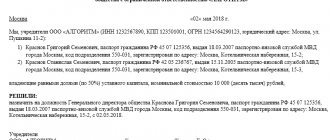The failure of the defendant to appear in court is quite common and creates a number of problems both for the plaintiff and for the court itself.
Today we will talk about absentee proceedings, consider the grounds and procedure for its implementation, and figure out how to cancel and (or) appeal a court decision in absentia. If you are participating in a trial or are just going to court, the information below will definitely be useful to you and will help you understand such an important procedural institution as “absentia proceedings.”
Absentee proceedings. Reasons and order
Absentee proceedings are the consideration by a court of a civil case in the absence (if the defendant fails to appear) at the court hearing.
The institution of absentee proceedings is aimed at maintaining a balance of interests of the parties (plaintiff and defendant) in civil proceedings. Agree, the plaintiff cannot endlessly wait for the court to resolve the issue of his claims against the defendant, who does not want or simply avoids appearing in court.
The mere failure of the defendant to appear is not enough for proceedings in absentia. Three additional conditions are required:
- The defendant must be properly notified of the time and place of the trial;
- The case materials must not contain a message from the defendant about valid reasons for his absence;
- There is no request on the part of the defendant to consider the case in his absence.
Absentee proceedings are possible only in the court of first instance.
The court must make an appropriate ruling on the application of such proceedings.
Procedural legislation does not require a separate definition. Therefore, in practice, such a definition has a protocol form. First, the court ascertains the opinion of the participants in the process about the possibility of considering the case in absentia, and then resolves this issue by announcing the ruling. Accordingly, all this is recorded in the minutes of the court hearing.
The procedure for considering a case in absentia is no different from the general procedure. The court also examines the evidence, listens to the arguments of the participants and makes a decision. The only and natural difference from a trial in which all parties participate is the inability of the defendant to participate in the hearing due to his absence.
An important point is the situation when several defendants are involved in the case. Can a court consider a case in absentia if at least one defendant appears at the court hearing?
Procedural law gives a clear answer to this question. To consider a case in absentia, it is necessary that all defendants fail to appear. Only in this case is it possible to consider the case in absentia.
It cannot be said that the key figure in absentee proceedings is the defendant. Still, to a greater extent, the trial in absentia is aimed at protecting the rights of the plaintiff, not the defendant. The procedural rights of the defendant are protected by providing him with the opportunity to cancel the default judgment without appealing to a higher authority, but we will talk about this below.
In addition to the failure of the defendant to appear at the court hearing, the legislator established the existence of a decisive expression of will of the plaintiff who appeared at the hearing for the trial in absentia. Consideration of a civil case in absentia requires his consent. Otherwise, if the plaintiff has filed an objection, the court adjourns the consideration of the case and notifies the defendant of the time and place of the next hearing.
Sometimes there is a situation when, at a court hearing, the plaintiff changes the subject or basis of the claim. In this case, regardless of the will of the plaintiff who appears, the court cannot consider the case in absentia and is obliged to postpone the trial by sending updated claims to the defendant.
Good to know
The order in absentia can be applied only in claims and special proceedings. Civil cases considered by writ proceedings cannot be considered in absentia.
As a small digression, we list the forms of proceedings in a court of general jurisdiction of the first instance:
- Order proceedings;
- Claim proceedings;
- Special production.
Conditions and procedure for absentee proceedings
For the occurrence of proceedings in absentia and its completion by a decision in absentia, certain conditions must be present.
Article 233 of the Code of Civil Procedure of the Russian Federation establishes the grounds for proceedings in absentia (essential conditions):
1) failure of the defendant (all defendants) to appear at the court hearing:
- notified of the time and place of the court hearing;
- who failed to report valid reasons for absence;
- who did not ask for the case to be considered in his absence;
2) the consent of the plaintiff to consider the case in absentia proceedings in the absence of the defendant.
No default judgment will be made:
- when the plaintiff changes the subject or basis of the claim, or increases the size of the claim (Article 233 of the Code of Civil Procedure of the Russian Federation);
- the defendant’s failure to appear is due to valid reasons of which the court has been notified;
- the defendant asked to consider the case in his absence;
- the parties who did not apply for the case to be heard without them did not appear without good reason for a second summons;
- the defendant did not appear, but his representative was present.
Despite the fact that absentee proceedings are a real means of ensuring timely justice, the plaintiff may not agree to use it due to the fear of the default judgment being overturned due to the defendant having significant evidence and good reasons for his failure to appear at the court hearing.
If the plaintiff does not agree to have the case heard in absentia, the court postpones the proceedings and sends the defaulting defendant a notice of the time and place of a new court hearing (Part 3 of Article 233 of the Code of Civil Procedure of the Russian Federation). The plaintiff may object to a default judgment, and even an unmotivated disagreement is sufficient. This follows from the principle of discretion and is not subject to judicial intervention and control.
When considering a case in absentia, the court holds a hearing in the general manner, examines the evidence presented by the persons participating in the case, takes into account their arguments and makes a decision, which is called in absentia.
Absentee decision
Based on the results of consideration of the case in absentia proceedings, the court makes a decision, it is called in absentia.
The requirements for the content of a default decision are the same as for a direct decision.
A direct decision means a court decision that was made in a general manner, i.e. without conducting absentee proceedings. There is no such term in the regulatory framework and it is used in professional slang.
Just like a direct decision, a decision in absentia consists of 4 parts: introductory, descriptive, motivational and operative.
A mandatory requirement, set out in a separate line in the law, is to indicate in the operative part of the decision in absentia the deadline and procedure for filing an application (not to be confused with an appeal) to cancel the decision.
Based on the results, the absentee decision will differ in the following attributes: it will be called not “Decision”, but “Absentee Decision”; will contain references to circumstances and rules of law that allow the case to be considered in absentia proceedings; will explain the deadline and procedure for filing an application to cancel a default judgment.
A copy of the default judgment is sent to the defendant, as well as to the plaintiff, who was not present at the court hearing and asked to consider the case in his absence. The deadline for sending is within three days from the date of the decision, the form is by registered mail with acknowledgment of delivery.
Note!
The phrase “from the date of the decision” should not be confused with “making a decision” and “drawing up a reasoned decision.” The court's decision is made in the deliberation room immediately after the hearing of the case. After this, the court announces its operative part. Drawing up a reasoned court decision can be postponed, but no more than five days.
Unfortunately, judges often neglect the requirements of procedural law and, instead of proceedings in absentia, consider some cases in the usual manner. The result of this is a direct rather than a default judgment, which prevents the defendant from filing an application to have the judgment set aside.
In most cases, this is done in court cases, the outcome of which is easily predictable and has a minimal controversial component. A certain level of knowledge in the field of law and experience in resolving disputes allows judges to conduct a legal analysis and make a certain forecast. This approach is not malicious and aims to respect not only the procedural rights of the defendant, but also the plaintiff.
As a rule, higher courts are deaf to the arguments of the complaint that the court of first instance ignored the proceedings in absentia. Taking into account the fact that at present the appellate court does not have the right to cancel the appealed decision and send the case for a new trial, there is no tool for correcting the court’s indicated error.
Contents of the default judgment
The final decision must be drawn up in accordance with the requirements of Art. 198 Code of Civil Procedure of the Russian Federation. The document consists of four mandatory parts.
| Introductory | Information about all participants in the case is indicated, including the judges, plaintiff, defendant, representative, as well as the date and place of the decision. |
| Descriptive | The applicant's demands, the presence of objections from the respondent or explanations from other participants are described in detail. |
| Motivational | This reflects the circumstances that were discovered by the court during the trial, which made it possible to draw appropriate conclusions in the case. |
| Resolution | The judge concludes: · satisfy the claim in full or in part; · refuse claims. |
The operative part must contain information about who should bear the legal costs of the case, within what time frame one can appeal this decision and the procedure for appealing.
Cancellation of a default judgment by the court of first instance
A defendant who disagrees with a court decision in absentia has the right to file an application to cancel such a decision.
The application must be submitted within seven days from the date of receipt of a copy of the default judgment. The day of delivery does not count towards this deadline. The application is submitted and addressed to the court that issued the default judgment.
The application to cancel a court decision in absentia must indicate:
- The name of the court whose default judgment the defendant requests to cancel;
- Name of the person submitting the application (procedural position, full name, additionally you can indicate the address and contact phone number);
- Circumstances that indicate the justification of the defendant’s failure to appear at the court hearing, about which he did not have the opportunity to notify the court in a timely manner; evidence of these circumstances;
- Circumstances and evidence that may affect the content of the default judgment;
- The defendant's request to cancel the default judgment;
- List of materials attached to the application.
Such a statement, as well as a statement of claim, a private or appeal complaint, and other procedural documents, is signed by the defendant or his representative and submitted to the court with copies attached according to the number of persons participating in the case.
An application to cancel a court decision in absentia is not subject to state fees.
The application is considered at a court hearing. The review period is 10 days from the date of its receipt. Persons participating in the case must be notified of the time and place of the consideration, they must be sent copies of the application and the materials attached to it. The failure of notified persons to appear is not an obstacle to the consideration of the application.
Based on the results of consideration of the application, the court refuses to satisfy the application or cancels it and resumes consideration of the case. The results are formalized in a separate determination, which cannot be appealed.
To cancel a default judgment, two conditions must be present simultaneously:
- The defendant’s failure to appear was due to valid reasons, and the defendant did not have an objective opportunity to notify the court about this in a timely manner;
- The presence of circumstances indicated by the defendant and evidence presented by him that may affect the content of the court decision.
Please note that respect alone is not enough. Cancellation of a decision only in order to re-hear the case and make a similar decision based on the same evidence is unacceptable.
As part of the resumed proceedings, the case is considered on its merits by the same or a different composition of judges.
If the duly notified defendant fails to appear at the court hearing this time, the newly adopted decision will not be in absentia, and the defendant does not have the right to file an application to cancel this decision in absentia proceedings.
Appeal against a default judgment
Just like the direct solution, i.e. adopted as part of the consideration of the case in a general (not absentee) manner, a decision in absentia can be appealed by filing an appeal to a higher court. After the case has passed through the appellate authority, a cassation appeal is possible.
To make it easier to understand the topic of appeal, we will highlight three main points: 1) the right to appeal a decision in absentia; 2) deadline for appeal; 3) entry into force of a court decision in absentia.
Who has the right to appeal a court decision in absentia?
Unlike an application to cancel a default judgment, an appeal against a default judgment can be filed not only by the defendant.
Part two of Article 237 of the Code of Civil Procedure of the Russian Federation contains an indication that such a decision can only be appealed by the parties. Strictly following the letter of the law, no other persons can appeal a default judgment.
In this case, it seems correct to proceed from the general provision regulating the appeal and, in particular, Article 320 of the Code of Civil Procedure of the Russian Federation, which determines the circle of persons entitled to appeal.
According to Article 320 of the Code of Civil Procedure of the Russian Federation, the right of appeal belongs to:
- To the Parties;
- Other persons participating in the case, including the prosecutor;
- Persons who were not involved in the case and whose rights and obligations were resolved by the court.
How long can a court decision be appealed in absentia?
The period for appealing a decision in absentia is one month.
The only and important point that distinguishes it from appealing a direct decision is the beginning of this period.
Here it is necessary to distinguish between two situations: 1) before filing an appeal, the defendant filed an application to cancel the default judgment, and this was denied, and 2) the defendant did not do this.
In the first situation, when the defendant has exercised his right to apply to the court to cancel the default judgment, an appeal can be filed within months from the date the court issues a ruling to refuse such an application.
As a general rule, the period begins to run on the day following the day such a determination is made.
For example, the decision to refuse was issued on August 1, the first day of the appeal period was August 2, the last day for filing an appeal was September 1.
In the second situation, when the defendant did not file an application to cancel the default judgment, an appeal may be filed within a month after the expiration of the period for filing such an application.
For clarity, let's look at an example by date.
- August 1 is the day the defendant receives a copy of the court’s decision in absentia
- August 2 is the first day of filing an application to cancel the default judgment
- August 8 is the last day for submitting such an application
- August 9 – first day for filing an appeal
- September 8th – last day for appeal
As you can see, everything is not so complicated. In the first case, the period for appeal was one month from the date the defendant received a copy of the decision in absentia, in the second - one month and 7 days.





